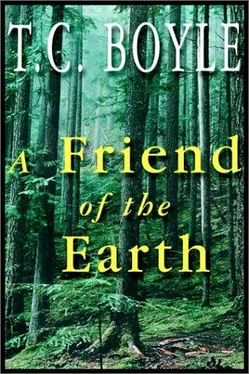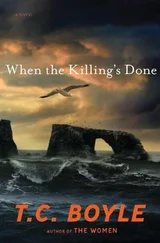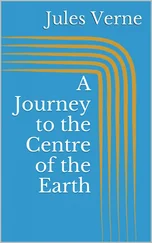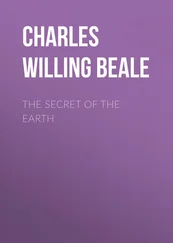It seemed as if it took an hour for her answer to drift all the way back to me, the tree quaking, the rain thrashing, my heart like a steel disc in the back of my throat, but her answer was no. "No!" She cried, cupping her thin white hands round her mouth to make it emphatic. "No!" And the message fell with the rain.
I was her father. I knew what she was like, heard the determination in her voice, the fanaticism: she wasn't coming down, not today, and there was no use arguing. "Tomorrow maybe?" I shouted, my neck already strained from flinging my head back to gape up at her "Till the storm stops, anyway? You can always go back up- when the weather clears!"
Again the answer drifted down, this time in a long-drawn-out bleat of protest: "N00000!"
All right. But did she need anything? "Do you need anything?" I shouted.
Rain trailed down my back. I was shivering spasmodically. My throat was sore. My head ached. In time, she would need all sorts of things: a chemical toilet, books, magazines, art supplies, a cell phone, fuel for her camp stove, a special harness so she could descend to thirty feet like a big pale spider and conduct the endless press interviews her crusade would generate. But now, on the first morning of her life as an arboreal creature, an evolutionary oddity, a female Homo sapiens of breeding age whose feet never touched the ground and whose biological imperative would have to wait, she needed nothing. Except a favor. "Can you do me a favor?" She called out of the drifting white flag of her face.
"Yeah," I shouted, digging at the back of my neck and pushing away from the tree for a less inflammatory angle. "Sure. Anything!"
"Take these," she called, and suddenly two objects, oblong, pale gray and streaking white, came sailing down out of the tree. It took me a minute to identify them, even after they landed separately in the duff not more than two feet from me. Thump, came the first of them, and then the second, slapping down beside me with the sound of finality. They were her shoes. Her shoes. Her running shoes, walking shoes, walking, breathing and living shoes, the very things that connected her to the earth. But she flung them down to me on that first morning, because she wouldn't be needing them, not anymore.
Eggs. Such a simple food, the sort of thing we used to take for granted, the mainstay of every greasy spoon in every town in America, scrambled, soft-boiled, over easy with home fries on the side. I grew up on eggs, in the time before we realized what they did to the arteries, and my daughter grew up on them too, simply because she had to get her protein somewhere. But as I say, eggs have been scarce at Chez Pulchris during the siege. The cook-her name is Fatima, by the way, and her husband is Zulfikar-served up omelets and fresh-baked bread for a week or so after we all moved in, but then the eggs were gone and it's been meat, rice and canned vegetables since. Oh, the tall Al managed to make it across the Pulchris River once or twice in the beginning, but the supermarkets had been stripped down to the bare shelves-nothing left but cornstarch and pickled beets — and after that even the Olfputt couldn't breach the floods and we all just stayed put and made do with what we had. So I'm looking forward to a plate of eggs, even if I do have to sop them up with chapatis instead of toast, and I kick off my boots on the doorstep and go in to wash up, change my shirt and slip into the black — and — gold satin tour jacket Mac gave me when I ran out of clothes a month back. Sun floods the windows, and I'm actually whistling-Ride your pony, Ride your pony-as I gaze into the mirror and slap on some of Mac's three-hundred-dollar-an-ounce aftershave.
We're gathering on the third floor, in the Gangsta Rap Room, as it turns out, for a formal brunch-Mac has an announcement to make. As Andrea and I step into the elevator, her arm tucked neatly into the crook of my elbow, I can already guess what he's going to say: he's leaving. Going north for the summer-Fairbanks, Winnipeg, maybe one of the big Hokkaido resorts. He'll climb into a helicopter, and he'll take the Ms with him (and none too soon for the shorter one, who must have put on a good thirty pounds of flab since the rains started). That's all right. I don't mind. As long as I have his commitment to rebuild, he can be on the far side of the moon for all it matters to me, not that I don't enjoy his company, don't get me wrong, but Mac is going to be Mac, and that means globe-trotting. That means excess. That means Mac in Edinburgh or Reykjavik, bent over the gaming tables or squiring some starlet round the tony eateries where they serve tuna garni or twenty-year-old monkfish at three thousand dollars a plate. I'm used to it.
At any rate, I'm feeling good as we glide through the door and into the dining room, the sun shining, eggs on the menu, the future looking bright. The table has been set for six (Chuy never joins us for meals, though Mac, I'm sure, would have no objection, being the democrat and humanitarian he is) and we're the first to arrive, followed shortly by April Wind. "Hell000, Ty!" She chirps, as if she hasn't seen me in months, and she bends to peck a kiss on Andrea's cheek before seating herself at the far end of the table, next to Mac's place. She's had an exciting winter, the dwarf woo-woo woman in the size 2 dress, rattling away at her Sierra book (tentatively titled For Love of the Trees) and romancing Mac. That's right. They found common ground in the Zodiac, Pantheism, holistic medicine, yin yang and the androgynous universe, and crystals, and since she was the only woman under sixty-seven washed up on Pulchris Isle, I guess it was inevitable that she caught Mac's eye. Not that he isn't discriminating, just practical.
Orange juice is on the table (fresh-squeezed, in a stone pitcher), a plate of chapatis and dishes of lime pickle and mango chutney, two bottles of champagne in iced buckets, kiwi fruit, bananas and kumquats from our own inundated orchards. I pour myself a glass of orange juice, twist off the wire and pop the cork on a bottle of Mumm's Cordon Rouge, 1999, from the Pulchris cellars. "So how's the book going?" I say, giving April Wind a look.
"Let me have a little of that, Ty." This is Andrea speaking. She wants champagne, and who can blame her after all that rotgut sake, but she also wants to deflect my question. She leans forward, tipping her wineglass under the lip of the bottle while I pour. It's hard to say what she's thinking, but my guess is that, if she had to choose between me and April, I'd be out the door. And that hurts. It does.
"April?" I ask, lifting my eyebrows and proffering the bottle.
"No, thanks." She has the look of a decrepit child, the limp black hair, the vaguely Asian eyes, the lipstickless mouth. She seems to be hugging her shoulders, which makes them appear even narrower, her miniature hands clasped before her, the totem dangling from her throat in its pathetic little sack. What could Mac possibly see in her?
I smack my lips over the champagne, dilute it with a splash of orange juice. "So the book?" I repeat, and I hear my father's voice, the half-mocking tone he'd use when he came into the kitchen at night to refill his drink and saw me sitting there at the table with my homework spread out before me like so much refuse. "So nu?" H e'd say.
April Wind ducks her head. She shrugs. Holds out her glass for orange juice. "As well as can be expected."
"No big publishers beating down the door?"
"Come on, Ty," Andrea says, exchanging a look with April Wind. The look says, Forgive him, he's being a jerk, and I am being a jerk, of course I am-that's my blood on those pages, and my daughter's.
"What's the celebration?" April Wind wants to know in her tiny piping kindergartner's voice, and I can't resist saying, "Mac's going away," just to watch her face fall.
Читать дальше












